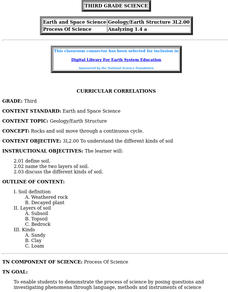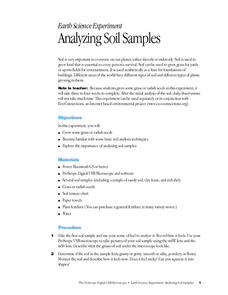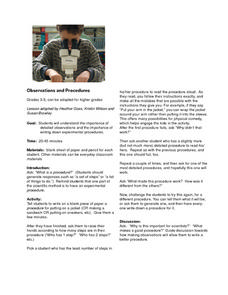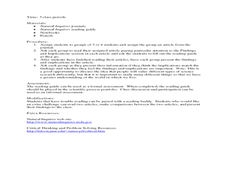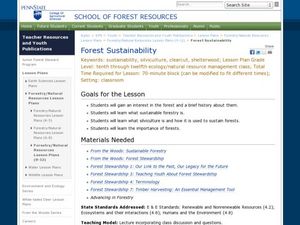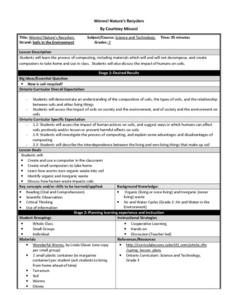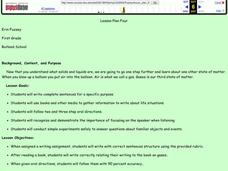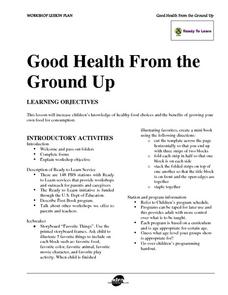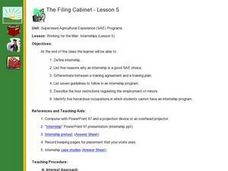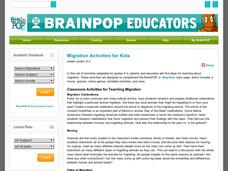Curated OER
Curricular Correlations
An interesting lesson plan on different types of soils is here for you. In it, learners discuss what soil is, and consider three piles of soil - clay, sand, and loam. During the rest of the lesson plan, third graders discover all sorts...
Curated OER
Analyzing Soil Samples
Students grow grass or radish seeds in this experiment, which takes three to four weeks to complete. They become familiar with basic soil analysis techniques, as well as, explore the importance of analyzing soil samples.
Curated OER
The Effects of Photosynthesis on Plant Growth
Young scholars examine the process of photosynthesis; its products and reactants, and the sequence of the process. They diagram the light reactions, record observations of plants, and discuss how difficult it is to measure plant growth...
Curated OER
Name that animal
A great way to classify organisms, is by counting the number of legs it has or how it moves. Little ones count the legs on five different creatures, then match the leg count to the proper animal name. Tip: Have them come up with other...
Curated OER
Observations and Procedures
Young scientists critique the breakdown of detailed observations. They discover the importance of writing down experimental procedures. There are some guided discussion questions at the end of the resource.
Curated OER
Atomic Structure in the Chemistry Classroom
Students are introduced to many of the scientists who contributed to the creation of the model of the atom. The changes to and evolution of the model over time is also covered. At the end of the lesson, Students differentiate between...
Curated OER
Discussing the Findings and Implications
Learners read a Natural Inquirer article and present the findings and implications to the class. They discuss if the findings match the implications and whether they think they are important.
Curated OER
Unit 21 Terrariums
The history of terrariums and how to construct one are presented in this PowerPoint. Each important step aspect of terrarium care is discussed: selecting a container, drainage, soil, types of plants, and maintenance. You will want to...
Curated OER
Forest Sustainability
High schoolers study major forests and their history. They see what sustainable forestry and silviculture is and discuss the topics on the attached worksheet.
Curated OER
Ozone Hole Expert Groups
Research topics associated with the hole in the ozone layer over Antarctica. Researchers write five facts about their topic and one question for each of those facts. They present what they learned to the rest of the class. Six topics are...
Curated OER
Folic Acid Health Campaign
A prewriting prompt, a class discussion, a website visit and accompanying worksheet, and a culminating group project make up this lesson on public health awareness. The topic is folic acid and how its absence in the diet may influence...
Michigan State University
Biological Control
Student determine how to manage pests using biological control. They examine how knowledge of the pest's food chain is helpful in managing pests. Finally, they identify the three groups of biological control agents. They listen, take...
Curated OER
Worms, Nature's Recyclers!
Learners study what worms need to survive in different environments. They study how worm composting improves soil and reduce waste. They discuss composting techniques and present a puppet show about a worm's life.
Curated OER
Survival Lesson Plan
Students participate in a survival lesson that teaches four steps to take in the event of dealing with an emergency. The skill of improvising is practiced and its importance is stressed as being resourceful. Students also cover the...
Curated OER
Matter
First graders are read a story about the various stages of matter with a focus on gases. Using a ziploc bag, they capture as much air as possible and discuss how it takes up space even though it is invisible. To end the lesson, they blow...
Curated OER
Chemistry Comes to Life
Although biochemistry of the human body is a vital topic, it doesn't have a chapter dedicated to it in many biology textbooks. If that's the case with your text, you can use this resource as a guide for designing your own lecture and as...
Curated OER
Kernels of Wisdom: Investigating Natural Variations in Corn
Here is a brain-popper! Corn, or more appropriately, maize, was intentionally domesticated by humans around 9,000 years ago and over a period of hundreds to thousands of years! Genetics and botany researchers have collaborated to find...
Curated OER
Where Does Your Garbage Go?
The objective of this lesson is to teach students about the importance of recycling. Initially, students have a chance to think about their impact on our planet by following the path that garbage takes. Students then learn about how...
Curated OER
Breathing and Holding Your Breath
Five questions are presented and answered as a means of delivering information on the respiratory system. Using red and blue game chips, physiology learners model the movement of blood through the lungs. Groups of learners time how long...
Curated OER
Good Health from the Ground Up
Students examine healthy food choices and the benefits of growing their own food for consumption. They read the story "Favorite Things" and illustrate 5 favorite things. Students discuss types of foods that are healthy choices and why it...
Curated OER
Energy Misconceptions
The plan is that future physicists take an "Energy Misconceptions" quiz before completing a series of activities that are focused on energy concepts. The activities, however, are not outlined in this resource; only the quiz and detailed...
Curated OER
Working for the Man: Internships
Students define internship and list five reasons why an internship is a good SAE choice. They differentiate between a training agreement and a training plan and list seven guidelines to follow when in an internship program. Finally,...
BrainPOP
Migration Activities for Kids
For as long as there has been life on earth, animals, including humans, have used migration as a means of survival. This collection of activities supports young scientists as they learn about this behavioral adaptation, encouraging them...
Curated OER
Scarcity of Water Throughout the World
Students identify the various forms of fresh water on the earth. They observe a demonstration aand read articles that show them the importance of water conservation. They write a journal about their opinion regarding paying for water.
